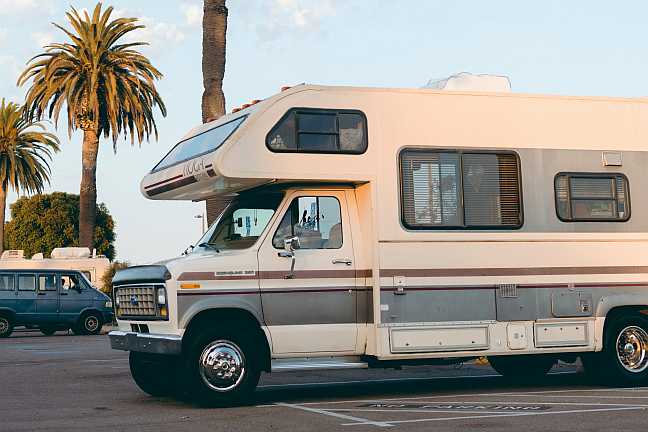Getting behind the wheel of a motorhome or RV isn’t just a young person’s game. Driving a Motorhome after 70 or 80 is becoming more common to see.
Early retirees, Snowbirds, and older people who need an office-on-wheels fit the bill. Once into the mobile lifestyle, it’s hard to give it up at any age!
Older RV owners sometimes think about quitting the travel lifestyle. Going back to a stick’s ‘n’ bricks existence, moving to a long-stay RV park or a tiny home is always an option. But driving a motorhome after 70 or 80 is still practical.
When you take care of yourself, complete yearly driving exams, and know your limitations, it’s possible to still enjoy your Golden Years in a motorhome or RV.
Let’s dig deeper into this issue to better understand what the different factors are in this decision.
Read Also: Difference Between Motorhome and RV
Age is But a Number
To some extent, age is just a number.
You can be an old 72-year-old or spry one who has no difficulty traveling around, performing maintenance on your rig, and just living the life.
When you’re physically fit, exercise regularly, and are in good health, then it doesn’t make sense to quit.
Make Adjustments as the Years Tack On
If you’re a full-timer, then the day-to-day rigmarole can become difficult as joints become less flexible, and bending down to check on something is painful.
When you have a travel trailer or camper being towed, then these will periodically need to be unhitched and re-hitched when moving on
It can sometimes require physical strength and a bit of agility to do so, which both decline with age.
Even walking over uneven roads or pathways becomes more difficult. But still, do what you can to stay fit and flexible. Believe us, it all helps; the completely sedentary senior is the one who runs into mobility issues later.
Read Also: How Long Do Travel Trailers Last?
Plan for Shorter Distances

To manage the declining energy and strength that comes with age, spend fewer hours on the road when driving to the next destination.
Plan to stay overnight at a park up, Walmart, or an RV campground roughly halfway to the destination.
Don’t get caught without a plan in fading light when your energy is flagging. Anticipate that you’ll get fatigued more easily. Accordingly, reduce the daily mileage you’re planning to cover. Enjoy the ride.
Also, take regular breaks to stretch the muscles out with a short leisurely walk. Muscles do tighten up when sitting in a fixed driving position, so this will help make the drive more bearable too.
Read Also: 15 RV Driving Tips for New RVers-Learn to Drive an RV
Declining Vision and Night Vision Issues
Most of us suffer from vision issues and won’t have 20/20 vision throughout our lives.
Vision Worsens Faster with Age
Almost all of us eventually end up needing glasses, contact lenses, or laser treatment to still see well enough to drive safely.
Ensure that you update your prescription and change your eyewear when it’s recommended to do so.
Night Vision Difficulties
It’s not uncommon to notice problems with seeing clearly as the light fades in the late afternoon through to early evening.
Commonly, many RVers prefer to travel during the daytime to avoid driving in the evening or at night. However, when you’re older, that’s a true necessity if your night vision has been deteriorating faster than your daytime vision.
The above situation is regularly seen in people over 70, so don’t be surprised.
If you fall into this category, plan to drive from mid-morning through to late afternoon only.
Read Also: Leaving Pets in RV
Establish a Network of RV Friends

The RV community is great. People are almost always happy to help fellow RVers in need.
This is particularly true when it comes to assisting people with mechanical issues, getting an RV out of the mud, or making recommendations for a better course of action.
It also helps if you periodically offer your services to people too.
If you’re not mechanically minded, maybe you’re a great cook or a whiz at technical issues like getting connected to Wi-Fi or 4G LTE.
We all assume everyone else can do what we can do but that’s not true.
Develop a strong reputation as a friendly, helpful person and it creates a little positive karma later when you might need some assistance too.
Some people choose to travel part of the year in a tribe of RVers living a similar lifestyle. They share potluck BBQ dinners and put on entertainment nights.
There’s safety in numbers and it’s also a great way to have company when you want it, so you don’t get bored when traveling solo.
Read Also: Camping and RVing: Which is the Right Choice?
Staying Healthy and Dealing with Medical Issues
The healthier that you can stay, the better.
Eating well and avoiding fast food is a good start. Getting regular exercise to act as a counterbalance to sitting down for many hours is excellent for promoting good health.
Naturally, you’ll have medical issues crop up now and again. These are likely to increase in frequency as the years add up.
When you’re a senior and over 70, you’ll likely be relying on Medicare insurance that covers you across the United States. While this will give you access to medical care, you won’t usually be able to pick your doctor or specialist when out of state.
So, you’ll need to go with the flow there, instead of expecting to see the same medical professional each time.
Also, anticipate that getting seen for pre-existing conditions might be harder than for newer health problems.
Travel Tip: Ensure you get a copy of your medical history to take with you on your travels.
Read Also: RV Dump Station Cost
Renewing Your Driving License More Regularly Than Before
Given the risk to eyesight and concentration as you age, it stands to reason that it becomes necessary to renew your driver’s license every year or so.
It includes a practical test behind the wheel of your RV. Treat this not as an inconvenience but as a good way to verify that you’re still safe on the road.
If you’re over 80, as an octogenarian, it might become necessary to take the test in your home state too. Bear this in mind when planning your travels to ensure the license renewal date doesn’t get in the way of the destinations you’re busy ticking off on your bucket list.
Even if you get to a stage where you’re unable to drive safely, it’s still possible to stay in a rentable RV or trailer on a commercial campsite or make other arrangements.
Going from mobile to static could include a switch to staying in a tiny home (you’re already used to living in smaller indoor spaces). Or, creating a homestead. Ultimately, there are always other options.

